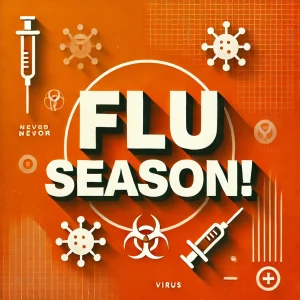
Understanding Flu Shot Importance for Your Health.
The flu shot is a safe and effective way to protect yourself and others from influenza, a potentially serious illness. With various types of flu vaccines available, including options for older adults and those with egg allergies, there’s a suitable choice for everyone. Getting vaccinated each year not only reduces your risk of catching the flu but also helps prevent its spread in your community. Learn more about the flu shot, its benefits, and which vaccine is right for you.
The flu shot, also known as the influenza vaccine, is a crucial tool in preventing the seasonal flu. Influenza is a contagious respiratory illness caused by influenza viruses that can lead to mild to severe illness and, in some cases, even death. The flu shot is designed to protect against specific strains of the flu virus and is recommended for people of all ages, with few exceptions. We will cover everything you need to know about the flu shot, including its benefits, efficacy, side effects, recommended recipients, and the importance of getting vaccinated.
How Does the Flu Shot Work?
The flu shot contains inactivated flu viruses or viral proteins, which prompt the body’s immune system to produce antibodies. These antibodies recognize and fight off the actual flu virus when exposed to it in the future. The vaccine is typically updated each year to match the circulating flu strains, making it more effective in providing protection against the specific flu variants that are most likely to circulate during the flu season.
Benefits of Getting the Flu Shot:
a. The primary purpose of the flu shot is to prevent individuals from contracting the flu virus. By getting vaccinated, you significantly reduce the risk of falling sick and spreading the virus to others.
b. Even if you get the flu despite being vaccinated, the flu shot can still lessen the severity and duration of the illness, potentially preventing complications and hospitalization.
c. Widespread vaccination helps achieve herd immunity, where a significant portion of the population is immune to the virus, protecting those who cannot receive the vaccine due to medical reasons.
The efficacy of the flu shot can vary from season to season depending on how well the vaccine matches the circulating flu strains. On average, the flu shot reduces the risk of flu illness by 40% to 60% when the vaccine is well-matched with the circulating strains. Even when there is not a perfect match, getting the flu shot can still provide partial protection and reduce the severity of the illness.
Recommended Recipients:
The Centers for Disease Control and Prevention (CDC) recommends that nearly everyone six months of age and older should get a flu shot each year. Exceptions include individuals with severe allergies to vaccine components and those who have had a severe reaction to a flu shot in the past. Pregnant women, older adults, young children, healthcare workers, and people with chronic health conditions are particularly encouraged to get vaccinated due to their higher risk of flu complications.

Types of Flu Vaccines:
There are several types of flu vaccines available, including:
a. Standard-dose trivalent and quadrivalent vaccines
These vaccines protect against three (trivalent) or four (quadrivalent) influenza virus strains, including both A and B types. They are suitable for most individuals aged 6 months and older.
b. High-dose vaccines for older adults
Designed specifically for individuals aged 65 and older, these vaccines contain a higher dose of antigen to boost immune response. They offer better protection in older adults, who may have weaker immune systems.
c. Adjuvanted vaccines for older adults
These vaccines include an adjuvant, a substance that enhances the body’s immune response to the vaccine. They are tailored for those 65 and older, providing improved effectiveness against influenza.
d. Intradermal vaccines using a smaller needle
Administered into the skin rather than muscle, these vaccines use a smaller needle and may be an option for people who dislike traditional injections. They offer protection similar to standard flu vaccines but are less commonly used.
e. Recombinant vaccines for people with egg allergies
Produced without using eggs, these vaccines are ideal for individuals with egg allergies. They are also approved for broader use in adults seeking an alternative to traditional flu vaccines.
Common Side Effects of Flu Vaccines:
Most people experience mild side effects, if any, after receiving the flu shot. Common side effects may include soreness, redness, or swelling at the injection site, mild fever, and fatigue. Serious side effects are rare.
Common Myths About Flu Vaccines Debunked
Despite widespread availability and proven benefits, flu vaccines are often surrounded by myths and misinformation. These misconceptions can lead to hesitation or avoidance of this important preventive measure, putting individuals and communities at greater risk of illness. Let’s separate fact from fiction by addressing some of the most common myths about flu vaccines.
Myth 1: The Flu Vaccine Can Give You the Flu
Fact: The flu vaccine cannot give you the flu. Vaccines either contain inactivated (dead) viruses or a single protein from the flu virus, neither of which can cause illness. Some people may experience mild side effects, like soreness or fatigue, but these are signs that your immune system is building protection—not that you’re getting sick.
Myth 2: Healthy People Don’t Need the Flu Vaccine
Fact: Even if you’re healthy, getting the flu vaccine is crucial. The flu can affect anyone and lead to serious complications, even in otherwise healthy individuals. Additionally, by getting vaccinated, you help protect those around you who may be more vulnerable, like infants, elderly people, and those with compromised immune systems.
Myth 3: The Flu Vaccine Isn’t Effective
Fact: While the flu vaccine is not 100% effective, it significantly reduces the risk of severe illness, hospitalization, and death. Even if you do contract the flu, being vaccinated can make your symptoms milder and recovery faster.
Myth 4: You Only Need to Get Vaccinated Once in Your Lifetime
Fact: Flu viruses mutate frequently, and immunity from the vaccine wanes over time. This is why it’s important to get vaccinated every year to stay protected against the most current strains of the virus.
Myth 5: The Flu Is Just a Bad Cold
Fact: The flu is much more serious than a common cold. It can cause high fever, severe body aches, and fatigue, and it can lead to life-threatening complications like pneumonia, especially in high-risk groups. The flu vaccine is your best defense against these risks.
Myth 6: Pregnant Women Should Avoid the Flu Vaccine
Fact: The flu vaccine is not only safe for pregnant women but also highly recommended. It helps protect both the mother and the baby, who will gain some immunity in the first few months of life.
Myth 7: If You’ve Already Had the Flu, You Don’t Need the Vaccine
Fact: Getting the flu once doesn’t mean you’re immune to all flu strains. The vaccine protects against multiple strains of the virus, so it’s still important to get vaccinated even if you’ve already been sick.
Myth 8: The Flu Vaccine Contains Harmful Ingredients
Fact: Flu vaccines are thoroughly tested for safety and approved by health authorities. The ingredients, such as preservatives or stabilizers, are present in minuscule amounts and are safe for nearly all individuals.
By understanding the truth about flu vaccines, you can make an informed decision for yourself and your family. The flu vaccine is a safe, effective, and vital tool in preventing illness and protecting your community. Don’t let myths stand in the way of your health—get vaccinated today!
Getting the flu shot is a safe and effective way to protect yourself and others from the influenza virus. Consult your healthcare provider to determine the most suitable flu vaccine for your age and health status and be sure to get vaccinated each year before the flu season begins. Stay informed, stay protected, and contribute to public health by getting your annual flu shot.
Disclaimer: The information provided in this content is for general informational purposes only. It is not intended as medical or healthcare advice, diagnosis, or treatment. Always seek the advice of a qualified healthcare professional with any questions you may have regarding a medical condition or healthcare decisions.


F*ckin’ amazing things here. I’m very glad to see your article. Thanks a lot and i am looking forward to contact you. Will you please drop me a e-mail?
This really answered my drawback, thank you!